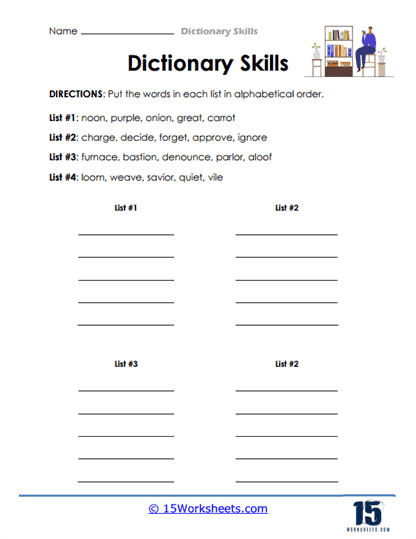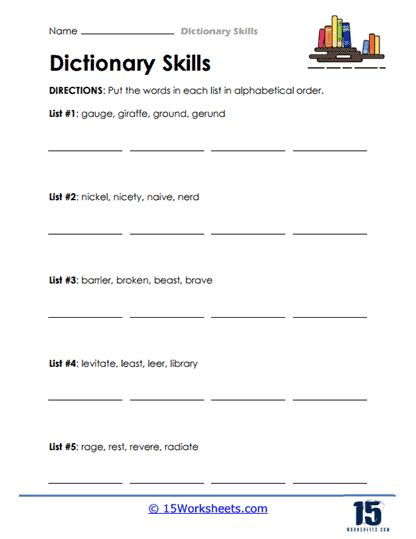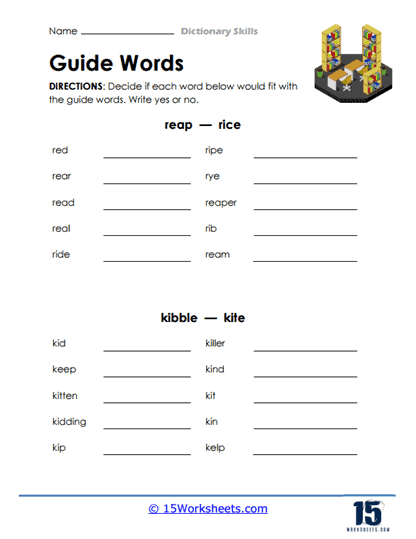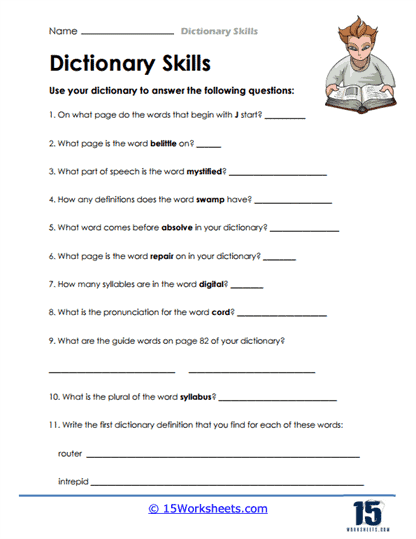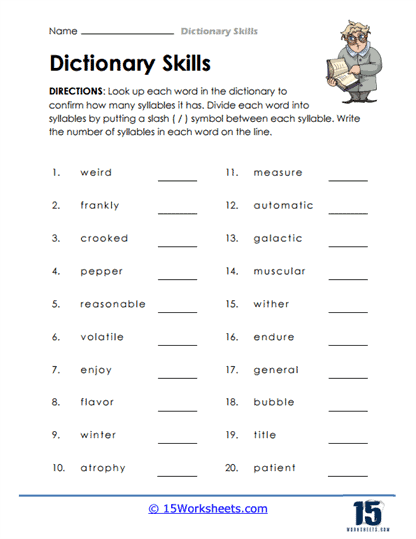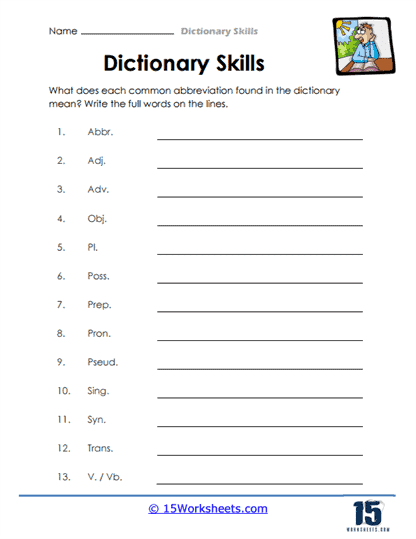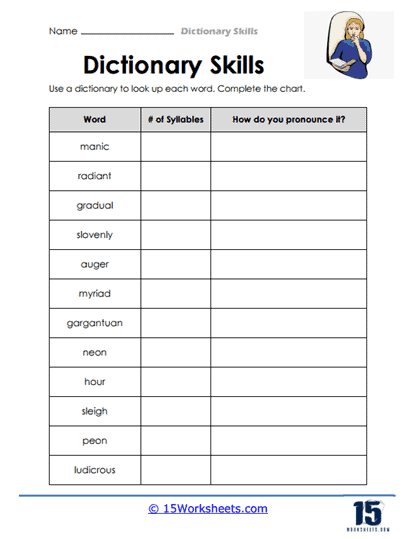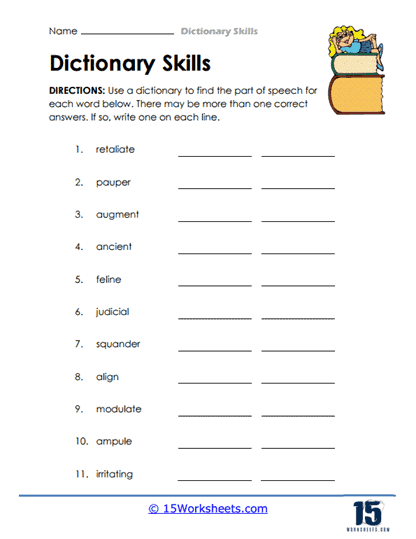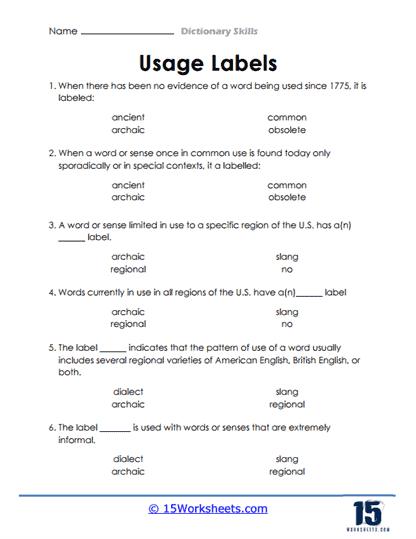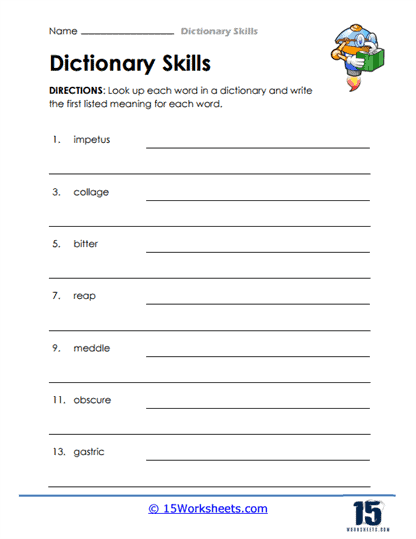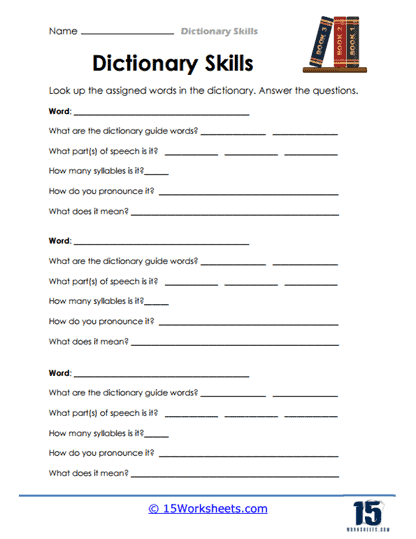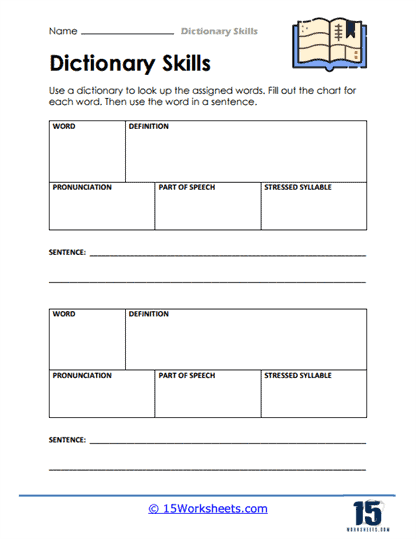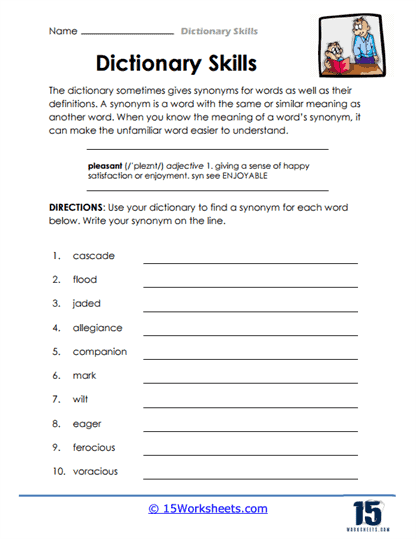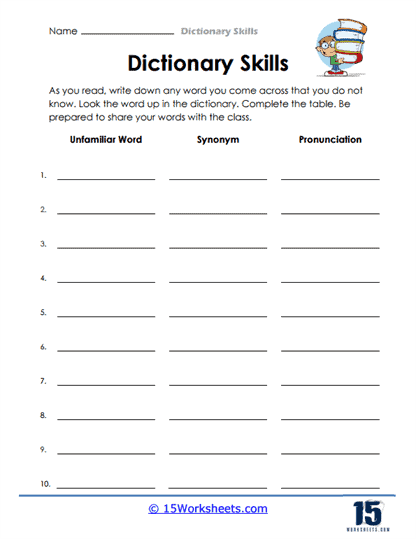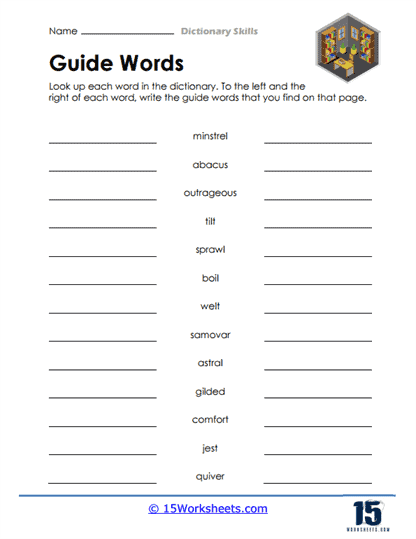Dictionary Skills Worksheets
All About These 15 Worksheets
Developing strong dictionary skills is essential for students to expand their vocabulary, improve language proficiency, and enhance their overall literacy. This series of 15 worksheets has been thoughtfully designed to help them master the art of using dictionaries effectively. Each worksheet focuses on different aspects of dictionary skills, providing guidance, exercises, and practice activities to enhance students’ understanding and application.
The worksheets in this series cover various elements of dictionary skills, including alphabetization, abbreviations, parts of speech, pronunciation, word meanings, synonyms, antonyms, and using context clues. By engaging with these worksheets, students will develop the skills necessary to navigate dictionaries, decode word meanings, and build a rich vocabulary.
By engaging with these worksheets, students will develop valuable language proficiency, enhance their vocabulary, and become proficient in using dictionaries as powerful tools for language exploration. These practical exercises and activities provide a foundation for them to expand their linguistic abilities, improve reading comprehension, and communicate effectively in various contexts. In summary, these worksheets foster a curiosity for words and language, empowering students to become lifelong learners in the realm of vocabulary and literacy.
A Look At Individual Worksheets
The journey begins with mastering the basics of alphabetical order through the “Alphabetical Order” and “From A To Z” worksheets. These activities challenge students to arrange words in the correct sequence, honing their ability to navigate dictionaries efficiently. The “Guide Words” worksheet further refines this skill by teaching students to use the guide words at the top of dictionary pages to locate entries quickly. These foundational skills are crucial for efficient dictionary use and set the stage for more advanced tasks.
Building upon this foundation, the worksheets delve into pronunciation and word structure. The “Count The Syllables” worksheet encourages students to break down words into syllables, enhancing their phonemic awareness and pronunciation skills. Meanwhile, “Common Abbreviations” introduces students to the shorthand used in dictionaries, such as “adj.” for adjective or “n.” for noun, demystifying the symbols that often perplex young learners. These activities not only improve reading fluency but also empower students to decode complex words independently.
The exploration continues with a focus on understanding word meanings and usage. “Word Look-Up” and “Primary Definitions” guide students in identifying the most relevant meanings of words with multiple definitions, while “Identifying Parts Of Speech” and “Usage Labels” help them discern how words function in different contexts. These worksheets foster critical thinking and contextual analysis, enabling students to grasp the nuances of language and apply words accurately in their writing and speech.
To enrich vocabulary and comprehension, the “Find The Synonym” and “Unfamiliar Words” worksheets challenge students to expand their lexicon and infer meanings from context. “Research The Words” and “Chart Fill-Out” encourage independent exploration, prompting students to investigate word origins, usage, and relationships. These tasks not only bolster vocabulary but also instill research skills and a deeper appreciation for the intricacies of language.
Why Bother with Dictionary Skills?
Let’s face it-when most people hear the word dictionary, their eyes glaze over and their brain conjures up memories of flipping through heavy books in dimly lit libraries, desperately hunting for a word that somehow always started with “P.” But don’t be fooled by the modest cover and alphabetical tyranny: dictionary skills are the unsung heroes of communication, writing, and learning in general.
First things first: vocabulary. Ever found yourself saying “thingy” or “whatchamacallit” one too many times? That’s where a dictionary swoops in like a linguistic superhero. The more words you know, the better you can express yourself. Suddenly, you’re not just hungry-you’re famished, ravenous, bordering on hangry. A dictionary helps you level up from grunts and vague gestures to eloquent, laser-precise conversation.
Then there’s reading comprehension. Ever read a sentence that made perfect sense until one rogue word derailed everything? A good dictionary skill set helps you decode those verbal landmines. Instead of skimming past the unfamiliar, you stop, look it up, and boom-you understand the paragraph, the chapter, maybe even the book. (Okay, maybe not Ulysses, but it’s a start.)
Writing? Oh yes, it improves that too. When you know the exact word you need, your writing becomes clearer, tighter, and way less likely to be mistaken for a random word salad. With a dictionary at your side, you can replace “nice” with “charming,” “interesting” with “riveting,” and “blah” with-well, almost anything.
Let’s not forget spelling and pronunciation. A dictionary doesn’t just help you know what a word means-it tells you how to say it and how not to embarrass yourself by writing “definately” when you meant “definitely.” It’s like having a judgy but helpful English teacher in your pocket (without the coffee breath).
But wait-there’s more! Knowing how to use a dictionary builds your language foundation from the ground up. We’re talking grammar, syntax, semantics-the stuff that makes you sound not just smart, but actually intelligible. This becomes especially handy if you’re learning a new language. After all, you can’t just gesture wildly and shout louder when your Spanish isn’t cutting it. That’s not communication-it’s a meltdown.
And yes, there’s even a thinking component. Dictionaries aren’t just for regurgitating definitions. Using one makes you stop and consider why that word fits-or doesn’t-in a sentence. It’s a mini critical thinking exercise every time. Like mental yoga, but with fewer awkward poses and more etymology.
Research skills? Check. The better you get at navigating dictionaries (digital or paper), the better you are at locating information elsewhere. You start noticing patterns in how information is structured, which turns you into a smarter, more efficient researcher. It’s like having a map when everyone else is just guessing which way is north.
And perhaps most importantly: independence. Dictionary skills mean you don’t have to ask your teacher, your boss, or your more literate cousin every time you hit a word wall. You figure it out yourself. That’s not just empowering-it’s a cornerstone of lifelong learning. Because let’s be honest, new words are popping up all the time. (Looking at you, “doomscrolling” and “yeet.”)

